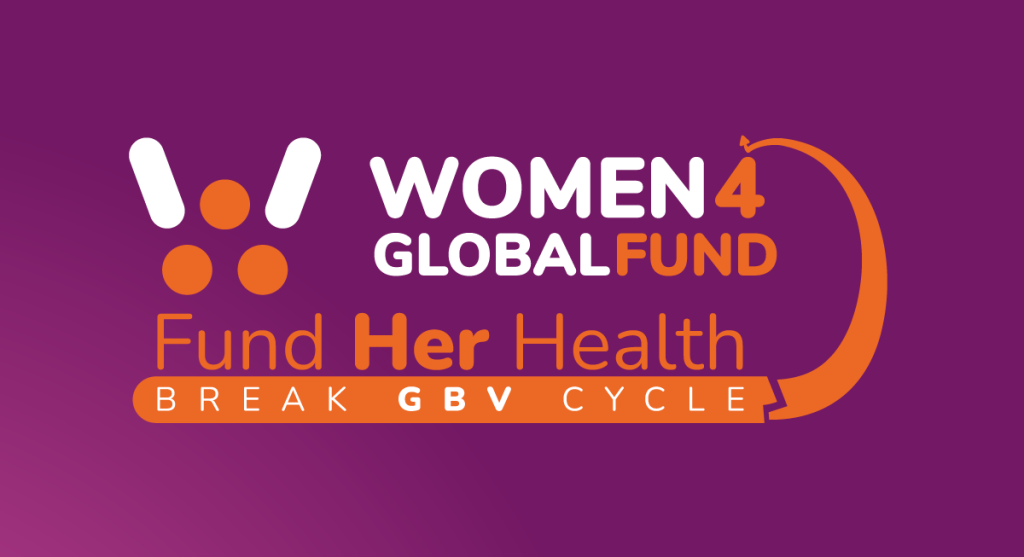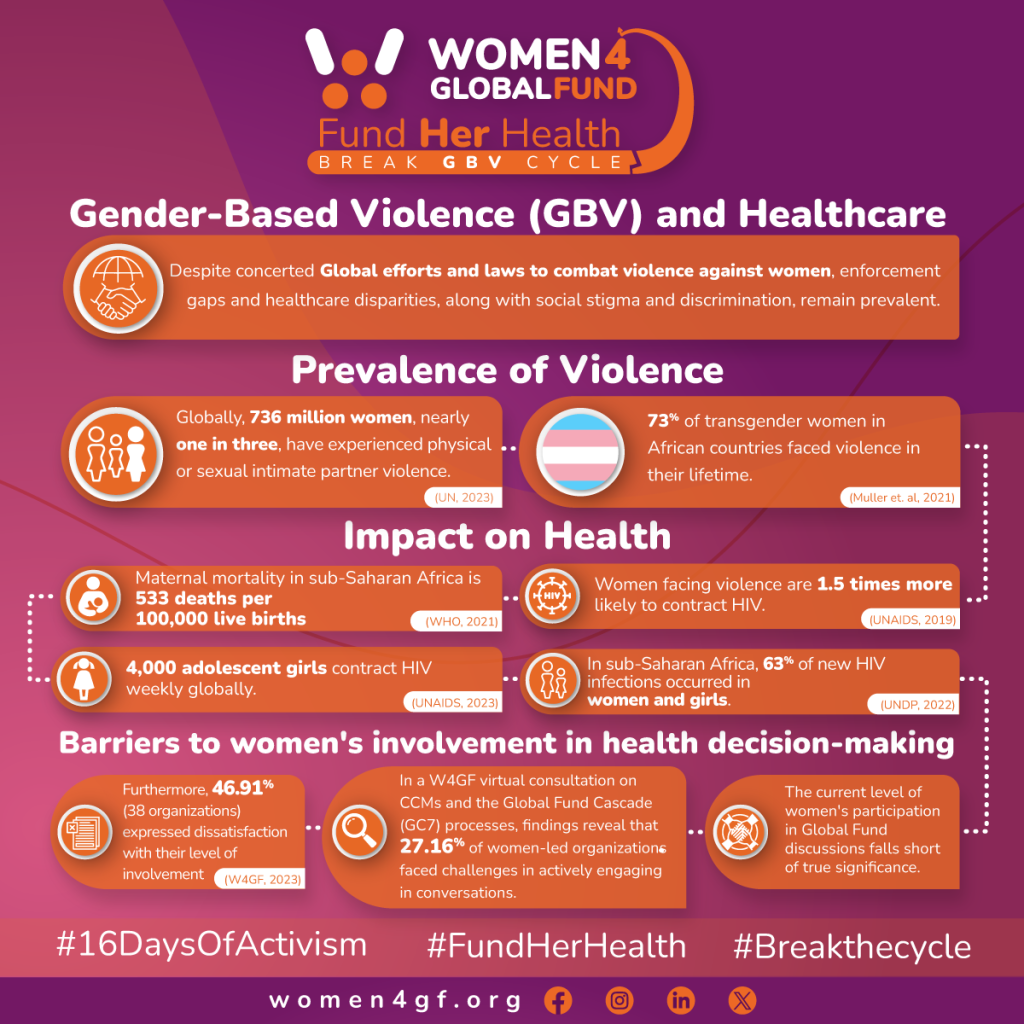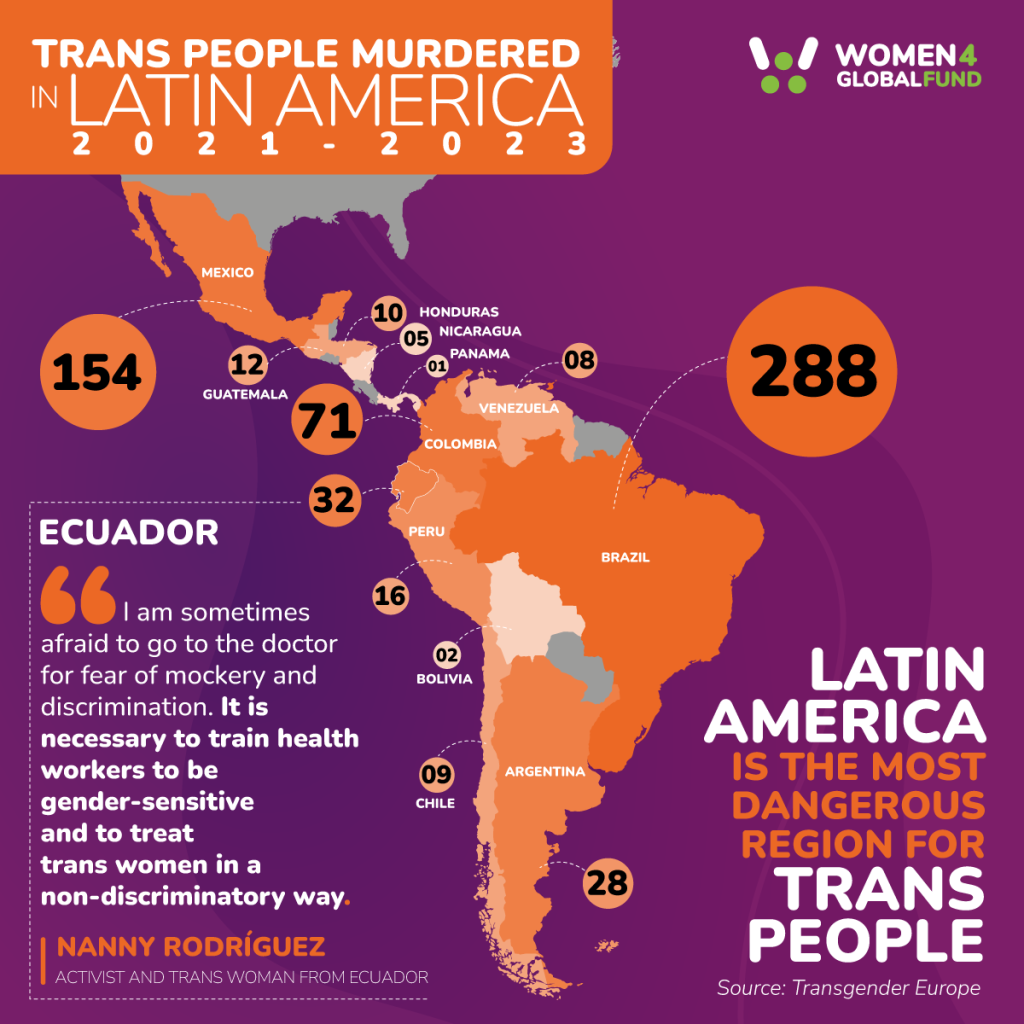
Fund Her Health. Break the cycle.
The Pandemic of Gender-Based Violence: A Health Crisis
On this International Day for the Elimination of Violence Against Women, we stand as a united global movement of 237 advocates across 75 countries, championing the integration of gender-based violence (GBV) prevention and response into health systems. Our mission is clear: health responses to HIV, TB, and malaria must confront and dismantle the structural violence that perpetuates inequities in access to care, particularly for women and girls.
The World Health Organization (WHO) estimates that 1 in 3 women globally have experienced physical or sexual violence in their lifetime (WHO, 2021). Beyond its devastating immediate impacts, GBV fuels long-term health disparities, especially in the context of HIV, TB, and malaria.
Survivors of GBV are at heightened risk of:
- Mental Health Struggles: Survivors of GBV face significant mental health challenges, frequently experiencing post-traumatic stress disorder (PTSD), depression, and anxiety. Research from the World Health Organization (2013) reveals that women exposed to GBV are nearly three times more likely to suffer from depression and four times more likely to develop PTSD compared to those who have not experienced violence. (World Health Organization, 2013).
- Sexual and Reproductive Health Risks: GBV disrupts antenatal care, leading to poor maternal and neonatal outcomes such as low birth weight, preterm delivery, and maternal mortality (Silverman et al., 2006). Sexual violence amplifies HIV transmission risks, with survivors 1.5 times more likely to acquire HIV. Psychological trauma can hinder treatment adherence, making it difficult to consistently take antiretroviral therapy (ART). Stigma and fear of retaliation further discourage survivors from accessing preventive measures like pre-exposure prophylaxis (PrEP) or HIV testing.
- Displacement and Conflict: In conflict zones, where GBV is pervasive, women face compounded risks due to limited access to menstrual health products, reproductive health services, or tools like insecticide-treated bed nets. This lack of resources heightens vulnerability to diseases like malaria. Protecting women in conflict settings, such as Palestinian and Afghan women, must remain a priority.
- Intersecting Stigma: GBV, HIV, TB, and malaria are each shrouded in stigma, creating compounded barriers to accessing care. Survivors often face dual stigma, which exacerbates their struggles and further entrenches poverty and poor health. Economic dependence, a frequent outcome of GBV, limits survivors’ ability to afford necessary treatments, perpetuating cycles of health inequity.
Call to Action: A Gender-Transformative Approach to Health Equity
To break the cycle of violence and injustice, health systems must prioritise gender equity as a cornerstone of global health strategies. Our collective efforts must include:
- Integrating GBV Services into Health Responses:
- We call for the integration of GBV services into responses for HIV, TB, and malaria. This includes conducting gender assessments to identify and address gaps in health services, formulating policies based on the findings, and establishing safe, survivor-friendly spaces within healthcare facilities. Health providers should be trained to offer trauma-informed care, and community engagement must support survivors in accessing these services.
- We call for the integration of GBV services into responses for HIV, TB, and malaria. This includes conducting gender assessments to identify and address gaps in health services, formulating policies based on the findings, and establishing safe, survivor-friendly spaces within healthcare facilities. Health providers should be trained to offer trauma-informed care, and community engagement must support survivors in accessing these services.
- Committing to advance Gender-Transformative Policies:
- We urge governments to develop and enforce comprehensive laws that protect GBV survivors and create frameworks to ensure safety and equity for women and girls in all their diversity. This requires advocacy campaigns and collaborations with civil society to counter the backlash from anti-rights groups and safeguard human rights-based health policies. Support local and regional movements that address these threats and uphold gender-transformative frameworks.
- We urge governments to develop and enforce comprehensive laws that protect GBV survivors and create frameworks to ensure safety and equity for women and girls in all their diversity. This requires advocacy campaigns and collaborations with civil society to counter the backlash from anti-rights groups and safeguard human rights-based health policies. Support local and regional movements that address these threats and uphold gender-transformative frameworks.
- Supporting the Global Partnership to Eliminate Stigma and Discrimination
- We strongly urge stakeholders to join and actively engage in the Global Partnership for Action to Eliminate All Forms of HIV-related Stigma and Discrimination. This includes creating concrete action plans with measurable outcomes, fostering collaboration among civil society, UN agencies, and affected communities, and ensuring consistent monitoring and reporting on progress to meet the goals of ending the AIDS epidemic by 2030.
- We strongly urge stakeholders to join and actively engage in the Global Partnership for Action to Eliminate All Forms of HIV-related Stigma and Discrimination. This includes creating concrete action plans with measurable outcomes, fostering collaboration among civil society, UN agencies, and affected communities, and ensuring consistent monitoring and reporting on progress to meet the goals of ending the AIDS epidemic by 2030.
- Mobilizing Financing for Gender Equity:
- We call on Member States to adopt gender-responsive budgeting across health financing mechanisms, allocating at least 30% of health budgets to the needs of women, adolescents, and girls—especially those affected by HIV, TB, malaria, and AMR. These funds must support gender-transformative programs focused on prevention, treatment, care, and capacity-building for women-led initiatives and community health workers.
- We call on Member States to adopt gender-responsive budgeting across health financing mechanisms, allocating at least 30% of health budgets to the needs of women, adolescents, and girls—especially those affected by HIV, TB, malaria, and AMR. These funds must support gender-transformative programs focused on prevention, treatment, care, and capacity-building for women-led initiatives and community health workers.
A Movement for Change: #FUNDHERHEALTH
The fight against HIV, TB, and malaria cannot succeed without addressing the systemic injustices that GBV perpetuates.
Today, we reaffirm our commitment to transforming health responses by centering women’s rights and gender equity. Together, we can break the cycle of violence and create a future where every woman and girl has the opportunity to live with dignity, free from violence, and with full access to the health services they deserve.
How you can Engage?
Share the following key messages to highlight the connection between GBV and limited access to health.
Tweet 1: GBV and Health Access
Denying women access to HIV, TB, and malaria services is a hidden form of gender-based violence. Health inequities perpetuate cycles of harm and deepen vulnerabilities. Let’s connect the dots and take action! #FUNDHERHEALTH
Tweet 2: GBV as a Pending Pandemic
Gender-based violence is a pandemic in its own right. From physical harm to systemic barriers, it affects millions daily. The time to act is now—addressing GBV in the integral responses of HIV, TB and malaria is essential for a just and equitable world. #FUNDHERHEALTH
Tweet 3: Funding for Change
Without funding, commitments to end gender-based violence and ensure health access are just words. Invest in gender-transformative solutions to tackle HIV, TB, and malaria—and save lives. #FUNDHERHEALTH
Click to Share our infographics and help us advocate based on evidence.










To get involved, write to us at communications@women4gf.org.
There is no excuse— funding is imperative to break Gender Based Violence cycle.
